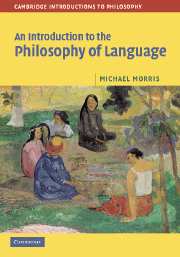Book contents
- Frontmatter
- Contents
- Acknowledgements
- Introduction
- 1 Locke and the nature of language
- 2 Frege on Sense and reference
- 3 Russell on definite descriptions
- 4 Kripke on proper names
- 5 Natural-kind terms
- 6 Quine on de re and de dicto modality
- 7 Reference and propositional attitudes
- 8 The semantics of propositional attitudes
- 9 Davidson on truth and meaning
- 10 Quine and Davidson on translation and interpretation
- 11 Quine on the indeterminacy of translation
- 12 Austin on speech acts
- 13 Grice on meaning
- 14 Kripke on the rule-following paradox
- 15 Wittgenstein on the Augustinian picture
- Glossary
- Works cited
- Index
9 - Davidson on truth and meaning
Published online by Cambridge University Press: 05 June 2012
- Frontmatter
- Contents
- Acknowledgements
- Introduction
- 1 Locke and the nature of language
- 2 Frege on Sense and reference
- 3 Russell on definite descriptions
- 4 Kripke on proper names
- 5 Natural-kind terms
- 6 Quine on de re and de dicto modality
- 7 Reference and propositional attitudes
- 8 The semantics of propositional attitudes
- 9 Davidson on truth and meaning
- 10 Quine and Davidson on translation and interpretation
- 11 Quine on the indeterminacy of translation
- 12 Austin on speech acts
- 13 Grice on meaning
- 14 Kripke on the rule-following paradox
- 15 Wittgenstein on the Augustinian picture
- Glossary
- Works cited
- Index
Summary
Key text
Donald Davidson, ‘Truth and Meaning’, in his Inquiries into Truth and Interpretation (Oxford: Oxford University Press, 1984), pp. 17–36.
Introduction
The meaning of sentences depends upon the meaning of their parts. This basic truth about language must be at the heart of any philosophy of language. In the analytic tradition, it guides the project of semantics, which attempts to provide a systematic theoretical explanation of precisely how the meaning of sentences depends on the meaning of their parts. We've seen this issue shaping all of our discussions so far. What does a definite description contribute to sentences of which it can form part? Is it an object referred to, together with the way in which it is given (as Frege thought), or does it, in context, assert the unique existence of something which satisfies some condition (as Russell proposed)? A parallel question arises for proper names: do they work in sentences in the way that definite descriptions do (whatever that is), or do they do something quite different? Again, should we give a descriptive account of what natural-kind terms contribute to the meaning of sentences involving them, or should they be regarded as directly referential? And the whole discussion of propositional-attitude constructions, from Frege himself onwards, is shaped by the difficulty of explaining what the words in the ‘that’-clauses of such constructions are contributing to the sentences which report propositional attitudes, given that they seem to be subject to peculiarly strict restrictions on substitution.
- Type
- Chapter
- Information
- An Introduction to the Philosophy of Language , pp. 173 - 193Publisher: Cambridge University PressPrint publication year: 2006



